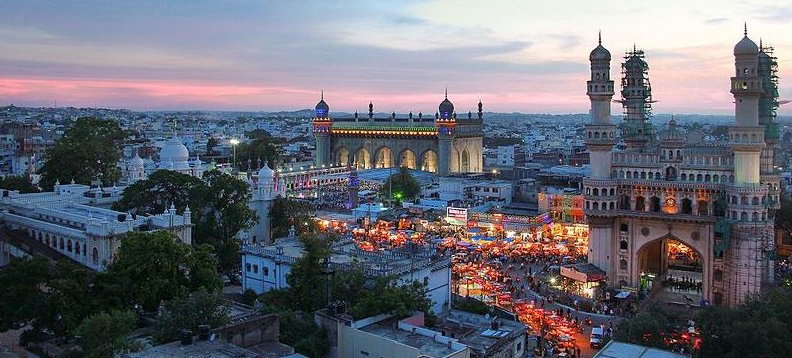The Sept. 9-10 G20 summit put a spotlight on India’s economy, which stands out for its rapid growth in biotech, particularly in the state of Telangana.
One-third of the vaccines produced worldwide are made in Hyderabad, capital of Telangana, and production is set to grow. But it’s not just vaccines that make Telangana a major force in India’s economy, the state is also a leader in a range of areas in biotech, as well as information technology.
This concentration of life sciences and information sciences opens up the possibility of cross-overs, with potential for medical breakthroughs. The city of Hyderabad has emerged as a hotbed of innovation, boasting major research clusters in both the life sciences and futuristic technology, including Genome Valley, Medical Devices Park, Hyderabad Pharma City, Hyderabad Knowledge City, IKP Knowledge Park, and Fab City.

The growth of biotech in Telangana has been supported through progressive government policies, according to Shakthi M. Nagappan, Director (Life Sciences and Pharma) at Government of Telangana, CEO of BioAsia, and CEO of Hyderabad Pharma City. In the following interview, he explains more.
Bio.News: Can you say something about the size and potential of the life sciences industry in Telangana—both in manufacturing and R&D? What about the region’s IT industry?
Nagappan: Telangana’s life sciences industry has experienced remarkable growth. The state’s progressive policies have fostered an environment conducive to both life sciences manufacturing and research and development. The present valuation of our life sciences ecosystem has exceeded $80 billion, with a compound annual growth rate of over 23% in the past two years alone, nearly double the national average. Our ambitious goal is to triple its size to reach $250 billion by 2030, driven by a strong emphasis on innovation, scalability, and capacity building.
Simultaneously, Telangana’s IT industry is a cornerstone of our innovation ecosystem. The convergence of life sciences and IT has further propelled Telangana into a trailblazing position, where we harness technology to drive advancements in healthcare, research, and innovation.
Notably, Novartis operates its second-largest global center in Hyderabad, boasting over 9,000 employees and an exceptional pool of life sciences talent. During 2022-23 alone, three of the top 10 global companies announced establishment of innovation centers in Hyderabad. Four (Novartis, BMS, Roche, and Sanofi) of the top 10 companies now have direct centers in Hyderabad.
Bio.News: With HITEC City and Genome Valley already established and Pharma City under development, Telangana has industry and research clusters in life sciences and IT. How do they drive innovation?
Nagappan: The establishment of HITEC City, Genome Valley, and our upcoming Pharma City reflects Telangana’s strategic approach to fostering innovation by building sustainable high tech industrial clusters. These clusters facilitate collaboration, co-location of expertise, and knowledge exchange. Our technology hub incubates groundbreaking tech solutions that empower healthcare advancements. Genome Valley, on the other hand, is a cradle of life sciences innovation, nurturing pharmaceuticals, biotechnology, and genomics research. As for Pharma City, its development reinforces our commitment to create a world-class ecosystem for pharmaceutical manufacturing. These clusters not only attract industry giants but also catalyze cross-industry collaboration.
Moreover, we actively support innovation through incentives and favorable policies. For instance, T-Hub, a government-sponsored innovation incubator, has already scaled over 1,000 startups.
Bio.News: How is regional academia able to contribute to innovation in IT and life sciences?
Nagappan: Telangana boasts a robust network of universities and research institutions that play a pivotal role in driving innovation. These institutions foster research partnerships and talent development in both IT and life sciences. Notable institutions helping shape the city’s intellectual landscape include the Indian Institute of Chemical Technology (IICT), Centre for Cellular and Molecular Biology (CCMB), Indian Institute of Technology Hyderabad (IIT-H), International Institute of Information Technology Hyderabad (IIIT-H), Birla Institute of Technology and Science (BITS-Hyderabad), the University of Hyderabad, and National Institute of Pharmaceutical Education and Research (NIPER).
With over 250,000 students in graduate programs across 4,750 institutions, our state offers access to one of the largest talent reservoirs.
The Telangana government is in the process of establishing a world-class life sciences university with the vision to “to promote innovation and empower today’s talent with skills of today and tomorrow.” As a step in this direction, the government has partnered with King’s College London to jointly develop and deliver a master’s program starting 2024, and many such global partnerships are also being explored.
Bio.News: Telangana IT Minister K.T. Rama Rao spoke of making Hyderabad a “health-tech mecca.” What are the state government and other stakeholders doing to achieve this?
Nagappan: The government is creating an enabling environment through policies, incentives, and infrastructure. We are fostering collaborations between life sciences and IT sectors, supporting startups, attracting global investments, and nurturing talent through skilling programs.
Telangana is home to more than 1,000 life sciences, pharma, and med-tech companies including the likes of Novartis, BMS, Sanofi, Roche, Medtronic, Bayer, Thermo Fisher, Dr. Reddy’s Laboratories, Hetero, Aurobindo—and 300+ health-tech startups. Hyderabad’s tech industry also thrives, with top companies like Microsoft, Google, Meta, Amazon, and Apple, among a range of other companies. Additionally, technology partners like Deloitte, Accenture, Tech Mahindra, and Infosys have a strong presence in Hyderabad through their delivery centers that drive core R&D and digital and engineering activities. The proximity of these health and tech industries makes Hyderabad a “natural health-tech destination.”
One interesting initiative is our collaboration with the World Economic Forum to set up the national Centre for the Fourth Industrial Revolution (C4IR) in Hyderabad, with a focus on life sciences.
Bio.News: Some innovators in Hyderabad already target biotech research with IT solutions. Can you say something about these or other health-tech firms in the state that specifically cater to the needs of biotech research?
Nagappan: Hyderabad has emerged as a prominent health-tech hub catering to biotech research organizations. Entrepreneurs and established players recognize the significance of data and evidence-based solutions to enhance patient care.
Cliniv, a leading health-tech firm, specializes in virtual clinical trials using telemedicine, wearable devices, and mobile apps for improved data collection and patient engagement. Similarly, Ocimum is harnessing data analytics for genomics solutions, while Mapmygenome focuses on personalized health through genetic testing and tailored health recommendations, combining biotech and IT.
Many other innovative companies amalgamating life sciences with technology are also shaping the future of healthcare through research and innovation. With their growth and new players emerging, they share a collective goal of advancing healthcare.
Bio.News: Several other companies work in health data, which could potentially enable research. Is this a possible growth area for health tech in Telangana?
Nagappan: Companies like PrimEra and ekincare, specialized in health data, hold immense potential to foster innovation and research. Telangana houses several other companies, such as ThoughtSphere, GSR Info Solutions, and BlueNeem Medical Devices, focusing on real-world data analytics, health data management, and data analytics.
These experts in health data analytics utilize advanced technologies like artificial intelligence and machine learning, providing valuable insights for disease management, personalized medicine, and population health.
Bio.News: What about employing IT solutions, such as AI, to enable drug discovery? Do you see special potential here?
Nagappan: Absolutely, the integration of IT solutions—especially AI in drug discovery—holds immense promise and is poised for substantial growth. The potential of AI to revolutionize the drug discovery process is a game-changer. Telangana, in particular, is at the forefront of exciting developments in this dynamic field.
Hyderabad’s pharma services ecosystem serves more than 1,000 companies, including big pharma giants and emerging biotechs. All of these entities are now channeling their investments and expertise towards harnessing the power of AI for discovery and development. The government is playing an active role in catalyzing this transformative journey by collaborating closely with these entities, facilitating a fast-paced integration of AI into the realm of drug discovery.
Bio.News: Is there anything else you’d like to add?
Nagappan: Telangana is poised to become a beacon of health-tech innovation, and we invite all stakeholders, industry leaders, and investors to join us on this transformative journey. Together, we can shape the future of healthcare and create a healthier and more sustainable world for all.




